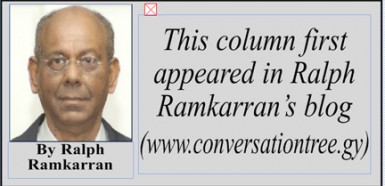The right to question took centre stage last week in the National Assembly. The Speaker ruled that Mr Anil Nandlall abused the right in relation to a number of questions tabled by him. The questions appeared to be quite innocuous, even if the information sought was a bit much. In relation to the persons pardoned by President Granger during last year, the questions asked for their names, addresses, offences committed, criminal records, length of sentences, process and criteria employed, how many persons granted pardons were subsequently charged with offences, the names of those persons and the offences for which they were charged.
 The Speaker was not required to and did not give any reasons for his ruling. But over the past fifteen years Speakers have sought to explain their rulings in order to demonstrate that their decisions are based on rational considerations. This effort was intended to limit allegations of bias.
The Speaker was not required to and did not give any reasons for his ruling. But over the past fifteen years Speakers have sought to explain their rulings in order to demonstrate that their decisions are based on rational considerations. This effort was intended to limit allegations of bias.
The Standing Orders do not define what is an abuse of the right to question, but we can try to figure it out. Standing Order (‘SO’) 20(1) starts with the following sentence: “Every Question shall conform to the following rules… “Fifteen rules follow, fourteen of which begin with the phrase “a Question shall not…” The fifteenth is close to that beginning. The next rule, SO 20(2), states: “If the Speaker is of the opinion that any Question…is an abuse of the right of questioning or infringes any of the provisions of this or any other Standing Order, he or she may direct – (a) that it may be printed or asked with such alterations as he or she may direct…”
It seems clear, therefore, that if a question blatantly or deliberately violates any one or more of the fifteen rules mentioned above, or any other Standing Order, it could be ruled to be an abuse of the right to question. But it may not be confined to the fifteen rules set out in SO 20. For example, the Speaker of the Indian Lok Sabha disallowed a number of questions that appeared to have been sponsored by multinational drug companies and sought to promote the interests of those companies as an abuse of the right to question. (Kashyap, Parliamentary Procedure, page 638 para. 55). Mr Nandlall’s questions do not appear to violate the prohibitions provided for in SO 20(1), or any other Standing Order, nor is it of the nature of those in the Indian Lok Sabha. The Speaker is, therefore, clearly seeing something that we are not. And the fact that he did not direct any alterations means that he felt that the questions were inadmissible in their entirety.
These issues would never have arisen if President Granger had released the names and other particulars of the persons that he had pardoned in response to questions rightly posed to him. Numbering 70 persons, the figure given by Guyana Chronicle of June 2, 2016, the President said at the time that young people should be in school and not in jail.
The decision was controversial because no criteria were announced, except that only non-violent offenders were pardoned. The names and other particulars of the prisoners were not released. The President said, as quoted in the above Guyana Chronicle: “I have behaved always in accordance with the constitution and on the advice of the Minister of Legal Affairs and as far as I am concerned, so long as I continue to behave in a legal manner, in a constitutional manner, the people of this country have nothing to fear.” In other words “Trust Me.” Adopting an uncharacteristically defiant and combative posture when further criticisms signalled that observers preferred institutional transparency to placing their trust in politicians, the President vowed to continue to pardon prisoners.
There is no doubt that the President has the power under Article 188(1) of the constitution to pardon prisoners. The exercise of that power is a commendable initiative and hardly likely to attract serious or sustained opposition in principle. But the public is entitled to know the criteria employed by the President, the names of the prisoners who have been released and the offences for which they have been charged. This is not and should not be treated as confidential information or state secrets.
The President is accountable to the people of Guyana who elected him and who now employ him and his government and pay their salaries. He and the government work for us and act on our behalf. We therefore have a right to ask him and them reasonable questions relating to our business, namely, the basis on which they perform their duties on our behalf and they have a duty to answer us.
The pardoning of prisoners is a very important matter. The prevailing secrecy and lack of transparency offend basic democratic norms. The Guyanese people through their lawful representatives, members of the National Assembly, are concerned. They sought but failed to elicit the information from the President. They resorted to the National Assembly. They failed there as well. Are we to understand that the President will now continue to pardon prisoners twice a year for as long as he holds office and refuse to account to the Guyanese people?





